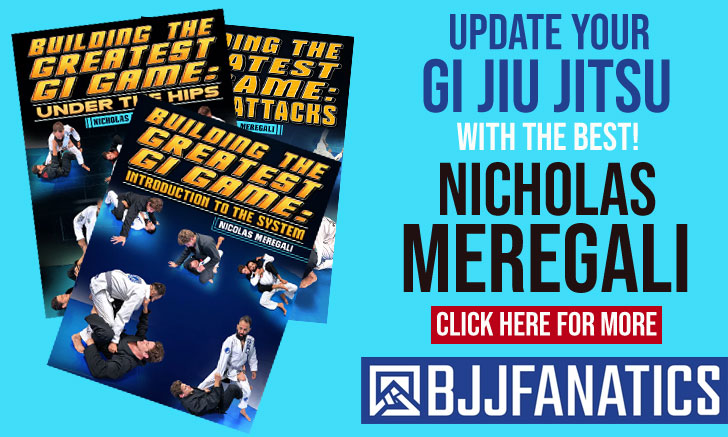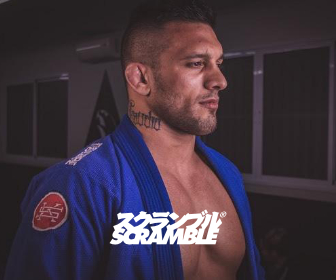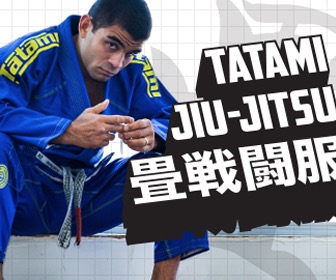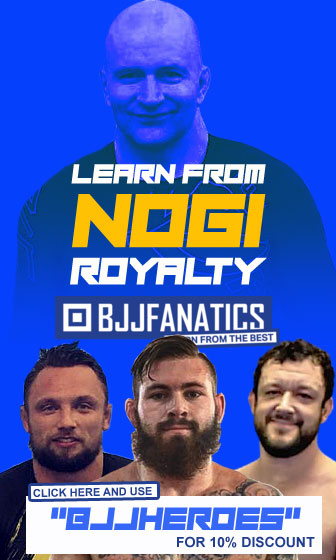This interview here presented was led by Bruno Fugazza, Senior Editor of BJJ Forum who kindly shared it with BJJ Heroes. In this piece Trans goes the reasons behind his competitive success, his move to the Emirates and fighting team mates:
In This last Worlds, you were having the best campaign of your career so far, but you ended up injured in your victory against Rodrigo Cavaca. How did the injury happen? Did you feel it right away and still were able to win? Or did you just realized you had problems after your body got colder?
Yes, I felt it right away, it happened right in the beginning when he put me in 50/50, I think I put a little too much weight forward thinking my leg was going to slip out, but my leg got caught in a strange angle and popped really bad. It happened very fast.
Right when it happened I knew right away that it was going to be difficult to continue, actually last year at Worlds in the fight before the final I hurt my left knee in a similar situation, also in 50/50, and it popped and became very loose as well, but I still continued to do the fight even though my knee was without any stability at all. But this time I could feel it was much worse, if you see the fight you can see it happens right in the beginning when he puts me in 50/50, and after you can see me pushing on the outside of my knee trying to hold it in place, because every time he tried pushing me to come on top my knee was slipping out of place. It was for sure one of the most intense pains I’ve felt while competing, it was even hard to concentrate on the fight, also with all the thoughts going through my mind, thinking if I’d be able to continue in the competition.
When I came out I still asked the medic to wrap it as hard as he could, but it just kept getting worse, and when I couldn’t put my shoes on because I couldn’t bend the leg, I realized there was no point. I wouldn’t be able to do anything and would injure myself even more. It was a really hard decision, but in reality the decision had already been made for me, I just had a hard time accepting it.
And how is your injury today? Did you get the chance to make an MRI? Already know if you’ll be able to fight the ADCC?
It’s been 2 weeks and I’m walking without crutches, and slowly starting to do some physiotherapy. I had my MRI done today, so in 2 days I’ll know if I’m going to need surgery. I never had any surgery until now, so I hope I won’t need it this time either. I told the people from ADCC that I’ll give them an answer at the end of this week, if I won’t need surgery I’ll do 3 more weeks of rehab, and then start training so I’ll get at least 8 weeks of training for the tournament, with less than that I don’t think it makes sense to go. If I’ll need surgery I’m probably not going to be competing anymore this year. But let’s see, I’m hoping for the best.
Talking about your fight with Cavaca, I’d like to ask your opinion about athletes from the same team closing out fights. Now you are fighting under UAE JJ flag, but event when you were defending Checkmat, we always saw you fighting teammates like Buchecha and Cavaca. In the other hand, this year we saw Evangelista opening to you on the semifinal of the Open Weight. How do you see the closing out in BJJ? Do you and your opponent have a talk before the fights and decide what will happen? Do you think that this should happen only between fighters who actually train together?
So, my opinion is that I don’t fight people I train with everyday, because I want to be able to relax and feel secure in the academy and be able to share information and not worrying about not showing my game etc. It just doesn’t become a healthy training environment for me if I know I’m going to fight the people I’m training with.
That being said, I don’t have a problem fighting people that are from the same team as me if we never train together. It did become a problem for me in my former team though, because I ended up in a situation where I was always fighting the best guys around my weight from the team, so it was difficult for me to go to the camps and to go and train with the rest of the team. So it’s a complicated issue, but I think that the best way to deal with 2 guys from the same team are fighting, is for everyone to shush and not interfere, if people are cheering and in some cases even telling one of the guys about the other ones game etc., I think that makes it difficult for people to maybe train together in the future after that, it did for me.
But you should always try to fight if you don’t train together on a regular basis in my opinion,, and also if you’re friends but not training together, it’s really hard, but we have to try and be professional about it. But ultimately, I think it should be up to the competitors, it doesn’t make sense making rules about it, even because then you’ll just have a lot of fake fights as you see in the events that forces teammates to enter the mat. It’s just part of the culture of our art, that’s how I was raised in Jiu-Jitsu, to not fight my teammates, so I’m not going to start doing it now.
You started training under Shimon (Mochizuki), in Denmark. This gym, even though “small”, has produced great competitors like you, Janni, Shanti and Ida. What is the “secret” for such success?
Actually I started training in an MMA-academy, the first year only no-gi. The person who taught me the basics of Jiu-Jitsu is a guy named João Pedro Santos, or “JP”, I trained with him until purple belt, and then in 2009 I moved to CheckMat in Denmark because there were only classes 3 times a week in my former academy, and I wanted to train and compete more.
There, Arte Suave is the name of the academy, it was 4 guys who had the academy at the time, 1 black belt and 3 brown belts, and they were good, always bringing people from Brazil to teach and share information. I think the key to the little bit of success I’ve had compared to the level in Europe in general, is that I had the opportunity to travel to Brazil often starting from 2010, to train and learn there. And then when in Denmark, I compensated for the lack of sparring partners by training a lot, training 3 times a day, doing a lot of physical conditioning, and always pushing myself as hard as I could, so that I was always exhausted in training, even if I didn’t have a lot of black belts or guys my weight to train with.
And what drove you to move from Denmark to live and train in the UAE?
I couldn’t train on the level I needed to compete in the big tournaments, and I wasn’t able to make a living off of Jiu-Jitsu. So I decided to move here because of the money, and also for having better training.
Here, it’s really difficult to train as an athlete, because I work a lot, and a lot of times there are meetings or tournaments that we have to work in after normal working hours or in the weekends, sometimes we even have a problem of finding a mat to train on because the place where we train often close due to events and such, but I can say that I’ve never had better training when talking about quality, and human material, there are a lot of really tough guys here.
And how has this experience been for you? Who are your main train partners, head coaches? And how different did you find the cultures between the countries?
It has been really difficult, it has been almost impossible to manage a job working close to 40 hours per week and sometimes more, and still training 12 times per week, 5-6 Jiu-Jitsu sessions and for the rest, physical preparation. It’s not enough compared to what I need to do to be competing at the level I am, but it has been the best option for me thus far. My teacher is Helder Medeiros (Bob Esponja), and I have a lot of really tough training partners, I can’t even start to say the names because for sure I’ll forget someone, there are too many.
The culture is very different, but I actually think that for the most part, the Emirates are pretty open to other cultures and let people keep their traditions, as long as they also respect theirs. For example they put Christmas decorations up in the shopping centres in December, even though it is a Islamic country, and there are Christian churches here as well, so I think that’s good.
I’ve had a good time here, I really can’t complain too much, it’s a good place for people who want to live a stable and secure life through Jiu-Jitsu.
Thank you very much, Trans! And if you’d like to make any final comments or thank your supporters, teammates or sponsors.
Thank you for the opportunity, it was a pleasure talking with you! I’d like to thank all my training partners, my sponsors Tatami Fightwear, Scitec Nutrition and Knockout Sports, and all the people who support me and appreciate my work! Oss!
Cover picture by “The Jiu Jitsu Nerd”.















